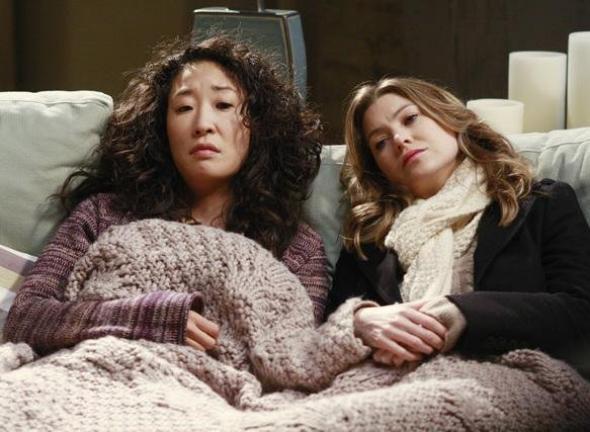After 10 seasons playing the intensely competitive intern/resident/cardiothoracic surgeon fellow Cristina Yang, Sandra Oh’s final episode of Grey’s Anatomy airs this Thursday. Oh’s departure has been mourned elsewhere, but the real loss is not simply the disappearance of Cristina, but the dissolution of the bond between Cristina and the show’s lead character, Meredith Grey (Ellen Pompeo). With those two characters, showrunner Shonda Rhimes and her team of writers created one of the most nuanced and realistic portrayals of female friendship on television.
I recently revisited the pilot, “A Hard Day’s Night,” and it reminded me that the show’s striking exploration of race and gender was there from the beginning. On their first day as surgical interns, Meredith points out to Cristina that there are only six women out of the 20 interns. “Yeah, and I hear one of them’s a model,” Cristina replies. “Seriously, like that’s going to help with the respect thing?” Later they poke fun of the “talent” of Meredith’s seizure patient, a pageant girl who does rhythmic gymnastics, a style of dance that typically includes some sort of prop (a ribbon, ball, or hoop, for instance).
But their dismissive jokes—which make sense coming from characters proud to succeed in a male-dominated field—soon lead the two to realize that an incident during the patient’s rhythmic gymnastics may explain her seizures. When Meredith scrubs in to assist with the surgery, she has an epiphany that signals her ability to see her patient as more than just a beauty queen: “There are lives in our hands,” she says via her signature voice over.
As long-time Grey’s viewers know, this was just the beginning of a beautiful, multi-layered relationship. Cristina and Meredith share several traits—they’re both driven and cynical and abrasive—but while Meredith comes off as emotionally damaged (Cristina dubs her “dark and twisty,” a descriptor Meredith soon accepts) and occasionally whiny, Cristina is stoic and pragmatic. This is a great combination on-screen, and it allows for moments of kinship as well as frustration, as when Cristina blows up at Meredith in the Season 5 premiere for being caught up in a “doomed” relationship with “McDreamy.”
Of course, this being a Shonda Rhimes vehicle, Cristina is “karmically impaled” by an overhanging icicle mere seconds after her rant. And then her recovery leads to a poignant moment in the following episode, when Meredith tells Cristina that she’s “the only one who knows me, darkly. Really knows me.”
Unlike other beloved TV friendships among women—on Sex and the City, The Golden Girls, Living Single, Girls, and so on—Cristina and Meredith also work together, and in a highly competitive field. The stakes reach beyond their romantic and personal entanglements: They are often in direct competition with one another, fighting to climb the career ladder while, sometimes fumblingly, also working to maintain their friendship.
Said Rhimes in an interview with O Magazine in 2006,
I wanted to create a world in which you felt as if you were watching very real women. Most of the women I saw on TV didn’t seem like people I actually knew. They felt like ideas of what women are. They never got to be nasty or competitive or hungry or angry. They were often just the loving wife or the nice friend. But who gets to be the bitch? Who gets to be the three-dimensional woman?
This past season has prepared us for the unfortunate loss of Oh by raising the stakes of their competition to its highest point thus far. Cristina opts to proceed on a groundbreaking surgery without Meredith, who has become noticeably distracted by her familial obligations. The critically lauded argument that ensues in “I Bet it Stung” seems to be the culmination of Rhimes’ original ambitions for her portrayal of women: Cristina’s blunt speech to Meredith about the latter’s decision to have children and its effect on her career elegantly dramatizes the endless, complicated debate over whether or not women can “have it all.”
When Cristina and Meredith finally reconciled in Episode 12, “Get Up, Stand Up,” the show didn’t let it come easily or neatly. Meredith reveals that she’s happy for Cristina’s success, but also incredibly jealous. Cristina admits that she’s changed in the years since they first started out together, and that it’s difficult for her to go after her dreams while “doing [it] alone.” Together, they accept that they’ve grown apart.
A critic’s darling for the first couple of seasons, Grey’s Anatomy has been dismissed as a cheesy, messy “soap opera” in its later years, and not without some merit—since the infamous Season 3 ferry incident, the show has trafficked in convoluted storylines and killed or seriously injured practically every doctor at Seattle Grace using various natural and man-made disasters and catastrophes. It has even unabashedly brought out the ghosts of dead patients past to return and haunt the doctors on more than one occasion. But amid the often-fantastical world of Grey’s, Cristina and Meredith’s complicated and messy friendship has remained the single, most grounded constant.
I suspect that the metaphorical—and only metaphorical, one hopes—ghost of Cristina Yang will haunt the show’s remaining seasons. While she may be leaving to pursue her dreams elsewhere, it seems clear that she will always be Meredith’s “person,” even if they’re not the same cynical surgical interns they once were.
